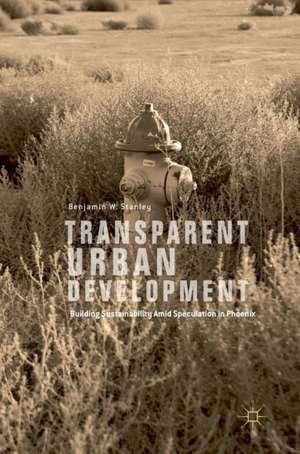Transparent Urban Development: Building Sustainability Amid Speculation in Phoenix
Autor Benjamin W. Stanleyen Limba Engleză Hardback – 9 aug 2017
| Toate formatele și edițiile | Preț | Express |
|---|---|---|
| Paperback (1) | 331.18 lei 38-45 zile | |
| Springer International Publishing – 12 aug 2018 | 331.18 lei 38-45 zile | |
| Hardback (1) | 398.53 lei 6-8 săpt. | |
| Springer International Publishing – 9 aug 2017 | 398.53 lei 6-8 săpt. |
Preț: 398.53 lei
Nou
Puncte Express: 598
Preț estimativ în valută:
76.27€ • 79.02$ • 63.65£
76.27€ • 79.02$ • 63.65£
Carte tipărită la comandă
Livrare economică 21 martie-04 aprilie
Preluare comenzi: 021 569.72.76
Specificații
ISBN-13: 9783319589091
ISBN-10: 3319589091
Pagini: 297
Ilustrații: XVII, 297 p. 30 illus. in color.
Dimensiuni: 148 x 210 mm
Greutate: 0.66 kg
Ediția:1st ed. 2017
Editura: Springer International Publishing
Colecția Palgrave Macmillan
Locul publicării:Cham, Switzerland
ISBN-10: 3319589091
Pagini: 297
Ilustrații: XVII, 297 p. 30 illus. in color.
Dimensiuni: 148 x 210 mm
Greutate: 0.66 kg
Ediția:1st ed. 2017
Editura: Springer International Publishing
Colecția Palgrave Macmillan
Locul publicării:Cham, Switzerland
Cuprins
1. Theories of Urban Growth, Sustainability, and Transparent Development.- 2. The Speculative Growth Paradigm in the History of Phoenix.- 3. A History of Property Development and Ownership in Downtown Phoenix.- 4. The Political Economy of Land Speculation in Downtown Phoenix.- 5. Policy Approaches to Transparent Urban Development in Phoenix.
Notă biografică
Benjamin W. Stanley is Instructor at Arizona State University’s School of Sustainability and Postdoctoral Research Associate at the University’s School of Human Evolution and Social Change. His interdisciplinary research interests are split between urban sustainability, the contemporary political economy of land development, and comparative urban history.
Caracteristici
Provides the first comprehensive, mixed methods study of land speculation and non-local property ownership Presents a novel definition of sustainable development rooted in ideals of transparency, local ownership, and dense urbanism Explores the history of property development in Phoenix to identify the social, economic, and policy barriers to constructing a more sustainably built environment Identifies tangible policy interventions to increase sustainability
